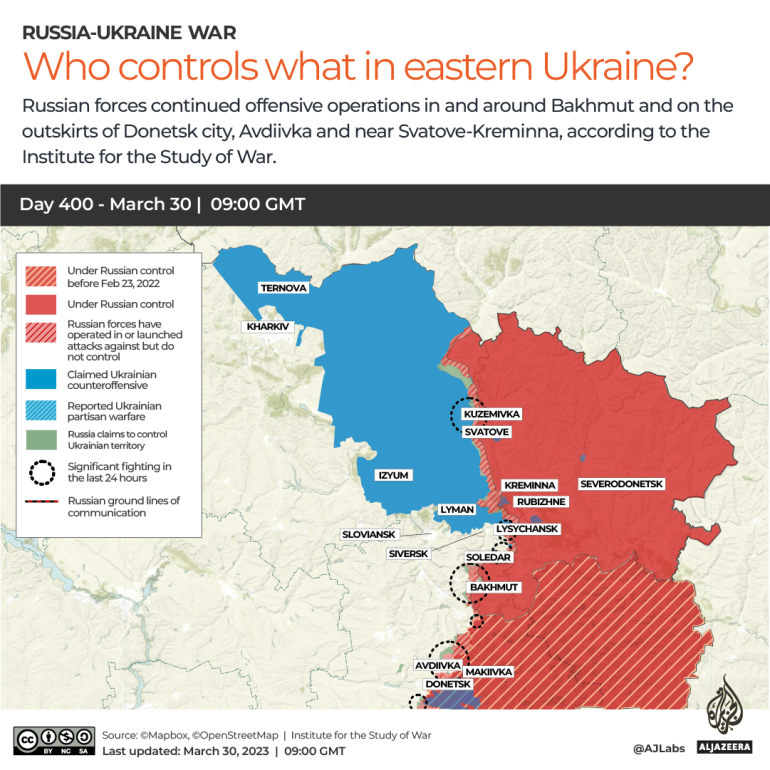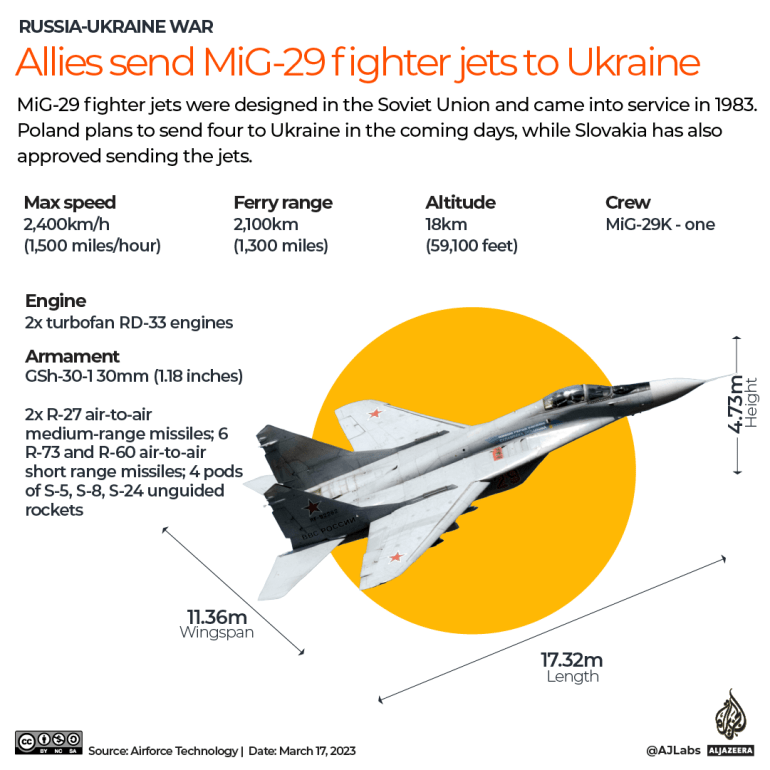Ukraine prepares for counterattack as Putin makes nuclear threats
Western battle tanks begin to arrive as Russian forces remain unable to break through Ukrainian defences.

Ukraine’s defences have held up against dozens of daily Russian ground assaults along the eastern front during the 57th week of the Russia-Ukraine war, while promised tanks and fighter jets have arrived to arm Ukraine’s expected counteroffensive.
To this gathering strength, Russian President Vladimir Putin has replied with a nuclear threat widely dismissed as evidence that he did not have an adequate conventional military response.
Keep reading
list of 4 itemsSpanish PM to talk Ukraine war and peace with China’s Xi Jinping
Capture of Bakhmut means Putin will ‘smell’ weakness: Ukraine
‘Some women have been forced into sex acts to cross a checkpoint’
Bakhmut, the eastern city levelled by months of fighting, remains key.
Assaults stretched from Kupiansk in Kharkiv province to Avdiivka in southern Donetsk.
But the toughest fighting seemed to take place in Bakhmut, where geolocated footage suggested Wagner Group mercenaries made advances from March 28 to 29.
The General Staff of the Armed Forces of Ukraine said Russian forces had met “with partial success”.
Footage provided by Russian newspaper Ria Novosti suggested Wagner mercenaries had captured the AZOM industrial complex within Bakhmut.
But Ukraine’s defenders were not evacuating.
“We are holding the Bakhmut fortress,” wrote Ukraine’s commander of ground forces Colonel-General Oleksandr Syrskyi.

Ukrainian President Volodymyr Zelenskyy explained the political and psychological rationale for fighting for Bakhmut.
If it fell, Putin would “sell this victory to the West, to his society, to China, to Iran”, Zelenskyy said.
“If he will feel some blood – smell that we are weak – he will push, push, push,” Zelenskyy told The Associated Press.
Syrskyi explained the military reasoning.
“Our main task is to wear down the overwhelming forces of the enemy and inflict heavy losses on him. This will … speed up our victory,” he said.
Eastern forces spokesman Serhiy Cherevaty said Wagner units were now being reinforced by regular Russian troops due to these losses.
United Kingdom military adviser Ian Stubbs told Vienna’s Organization for Security and Co-operation in Europe that Russia had suffered huge casualties in Bakhmut.
“Their assault seemingly stalled, reports suggest that the Russian military and Wagner Group urgently need to replenish personnel and munition stocks. Approximately 30,000 Russian fighters have been killed or wounded since the battle for Bakhmut began nine months ago, with the Wagner-dominated force advancing just 25km [16 miles] in this time,” Stubbs said.
“Try as they might to present an alternate reality to the ground truth with an increasingly ridiculous carpet of disinformation, the astounding levels of incompetence in Russia’s military leadership that have eroded Russia’s military reputation are clear for all to see.”

A separate Russian attempt to surround nearby Avdiivka culminated in failure.
“These attacks have now become not merely pointless, but actually harmful to Russian preparations for the next phase of this war, which will revolve around the upcoming Ukrainian counter-offensive,” wrote the Washington-based Institute for the Study of War, a think-tank, in its analysis.
The Ukrainian Center of National Resistance said Russia was seeking to hire 2,000 mercenaries from Belarus to replenish its dwindling numbers of experienced fighters, and had also hired 100 mercenaries from Angola.
The coming counteroffensive
In late January, Ukraine’s allies promised to send offensive weapons for the first time – and these began to arrive on schedule.
Eighteen German Leopard 2A6 main battle tanks – four more than expected – arrived on March 27.
“Our tanks, as promised, arrived on time to the hands of our Ukrainian friends,” German Defence Minister Boris Pistorius said.
The following day, Ukrainian Defence Minister Oleksii Reznikov revealed that 14 British Challenger 2 tanks had also arrived.
“These fantastic machines will soon begin their combat missions,” he said.
And the day after that, Ukraine said it had received three Leopard 2A6 tanks promised by Portugal.
This meant that of the 252 main battle tanks allies promised to Ukraine, 35 had been delivered.
The first four of 13 promised Slovak MiG-29s also landed in Ukraine on March 23.

Wagner Group chief Yevgeny Prigozhin said Ukraine was holding 200,000 troops in reserve to attack the eastern front line.
“They are very afraid of our counteroffensive, as evidenced by the interception of telephone conversations,” said Ukrainian Colonel Oleksiy Dmytrashkivskyi.
Ukrainian military intelligence spokesman Andriy Yusov said Russian collaborators had been warned to leave the Crimean Peninsula over FM radio on March 23, adding real estate sales suggested Russian families had already begun evacuating the peninsula.
The Ukrainian General Staff had information that Russian forces were digging trenches to strengthen defences in Crimea.
But Putin attempted to deny Ukrainian offensive capacity on Rossiya-24 television, saying the United States needed a month to replace the shells Ukraine fired in three days.
Twenty European countries have pledged to provide Ukraine with a million 155mm shells – a move Reznikov called “decisive” for the war – and France announced it was doubling the shells it was sending Ukraine to 2,000 a month as part of that pledge.
No F-16s – yet
Ukraine’s demand for Western fighter jets went unanswered, however.
US Secretary of Defense Lloyd Austin told the US Congress that he could not usefully supply F-16 fourth-generation fighters because of powerful Russian air defences and the length of time it would take the deploy the aircraft.
“That won’t help them in this current fight,” Austin said. “And will they have a capability at some point down the road? We all believe that they will.”

“The key message for us is that the United States of America is not abandoning its plans to transfer generation 4+ fighter jets, which Ukraine needs,” said Ukrainian Air Force spokesman Yuriy Ignat. “Yes, maybe it will take more time.”
Reznikov also fought back speculation that France was to supply Ukraine with Mirage fighters.
Zelenskyy insisted on Ukraine’s need for the jets and long-range weapons in a conference with European Union leaders. In their absence, he warned, the EU should prepare for a longer war.
“If Europe hesitates, evil can prepare itself for years of war, it is in your power not to allow this to happen,” he tweeted.
Nuclear threats
Putin said he had delivered the nuclear-capable Iskander missile system to Belarus, and a nuclear weapons storage facility would be constructed by July 1.
This was not a new threat.
Russia has said for months that it would modify Belarusian fighter jets to carry nuclear missiles.
“Putin is too predictable,” tweeted Ukrainian presidential adviser Mykhailo Podolyak. “Making a statement about tactical nuclear weapons in Belarus, he admits that he is afraid of losing and all he can do is scare with tactics.”
Ukraine’s military intelligence spokesman Andriy Yusov said the agency hadn’t seen movements of nuclear weapons.
EU High Representative for Foreign Affairs Josep Borrell called on Belarus to refuse the weapons, calling the move an “irresponsible escalation” and a “threat to European security” that would be met with new sanctions.
“Russia once again confirms its chronic inability to be a responsible possessor of nuclear weapons as a means of deterrence and prevention of war, not as a tool of threats and intimidation,” Ukraine’s foreign ministry said.
“I believe that despite the actual occupation of Belarus by the Russian Federation, this will not happen,” said Oleksiy Danilov, secretary of the National Security and Defence Council of Ukraine.
